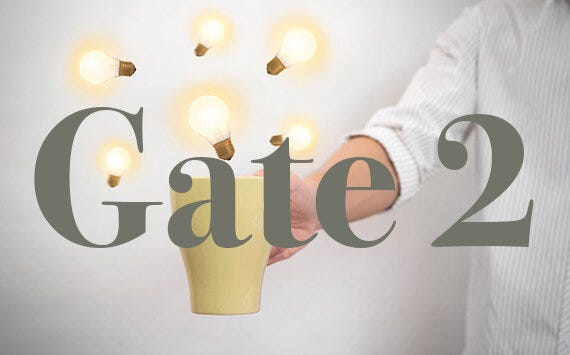Gate 2: Who Are You Selling to REALLY?
It took me 35 years to discover these five simple principles, or gates, to becoming a successful entrepreneur. If you enjoy this series, share it with a friend. To catch up, go to paparelli.com.
“We sell to the owner and to the contractor," Michael answered. Michael Pink is the founder of SmartPM. He presented at Angel Lounge early last year and was a hit. He introduced his company by explaining the problem in the market.
He said, "There are construction projects everywhere. They can be as small as redoing your kitchen or as large as building a new stadium for an NFL franchise. All of these projects have cost overruns. When discovered, everybody is pointing fingers because whoever is responsible has to pay."
This made total sense.
I built a house once, and it wasn't a very pleasant experience. We agreed up front how much the house was going to cost and then the building began.
Within a few short months, as the house moved from architectural plans to reality, the builder told me he needed more money. By the time he came to me on the overrun, I already had over $100k invested in the new house, and he was sitting on a construction loan of $100k.
We had a problem.
Neither of us could walk without losing a lot of money. The stress was determining who was going to pay for the mistakes and cost overruns. We had to hammer out a solution to get this house built. Not a fun time.
Michael said to our group, "This is what I used to do for a living as a consultant for Deloitte. I would get called into these big projects when the owner and builder were at each other's throats.
My job was to go through the project plan, the original budgets and financial statements and project schedule, and figure out where the construction project went off the rails and who was responsible."
"I did this for several years. It was the same analysis, done the same way, every time. I then came up with the idea, 'What if I automate this process?' And that was the beginning of SmartPM," he explained to the audience.
I invested because I believe in Michael.
He’s smart and he’s the right guy to build a company to solve this problem.
But there was work to be done. He needed to decide who owns the problem of the cost overrun? The building owner or the general contractor?
Why is this hard to answer? Michael was right to say they both owned the problem. But he has spent the last year figuring out who claims ownership of the problem.
Michael figured it out.
It's the building owner. It was true with my house, and it was true with Arthur Blank and Mercedes Benz Stadium. The owner is the guy who has to solve the problem.
In the end, the golden rule holds. He with the gold makes the rules. And he with the gold is the only guy who can solve the problem in the end.
Knowing who really owns the problem you are aiming to solve is critical to your business success. If you are selling to small businesses, the answer is easy. It is always the business owner.
But when selling to corporations, “Who owns the problem?" is a very difficult question to answer. If you get to the right answer, then you will always be talking to the right person, the real buyer. If you never answer this question with certainty, you'll waste hours of sales time and your close rate will be hit and miss.
Be sure you know who you are selling to.
It is the person who owns the problem you solve. When you figure this out, you’ve successfully passed through Gate #2.
But the next question is, “Is the person concerned enough about the problem to solve it?” This is Gate #3.


